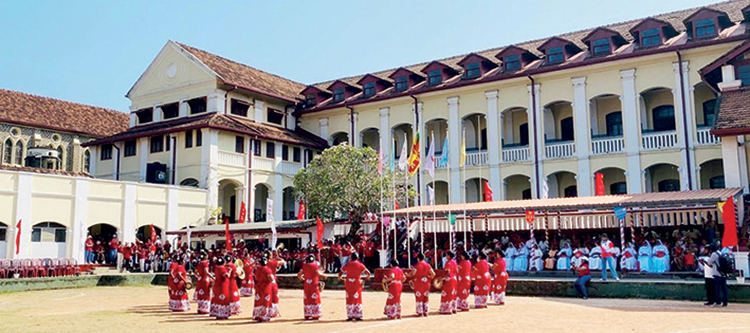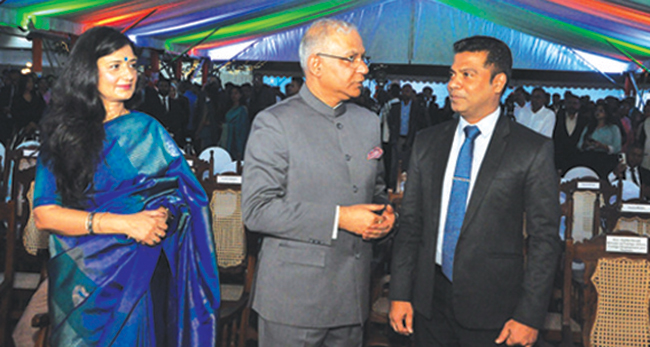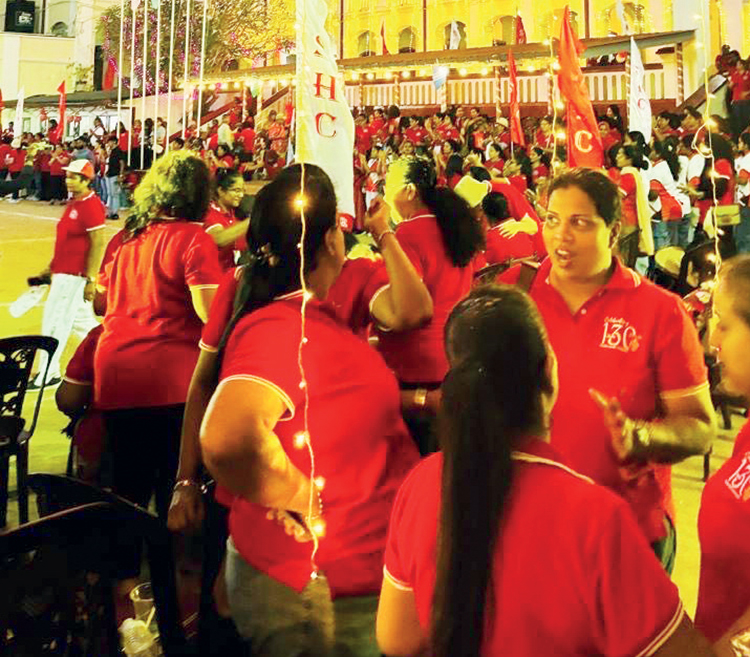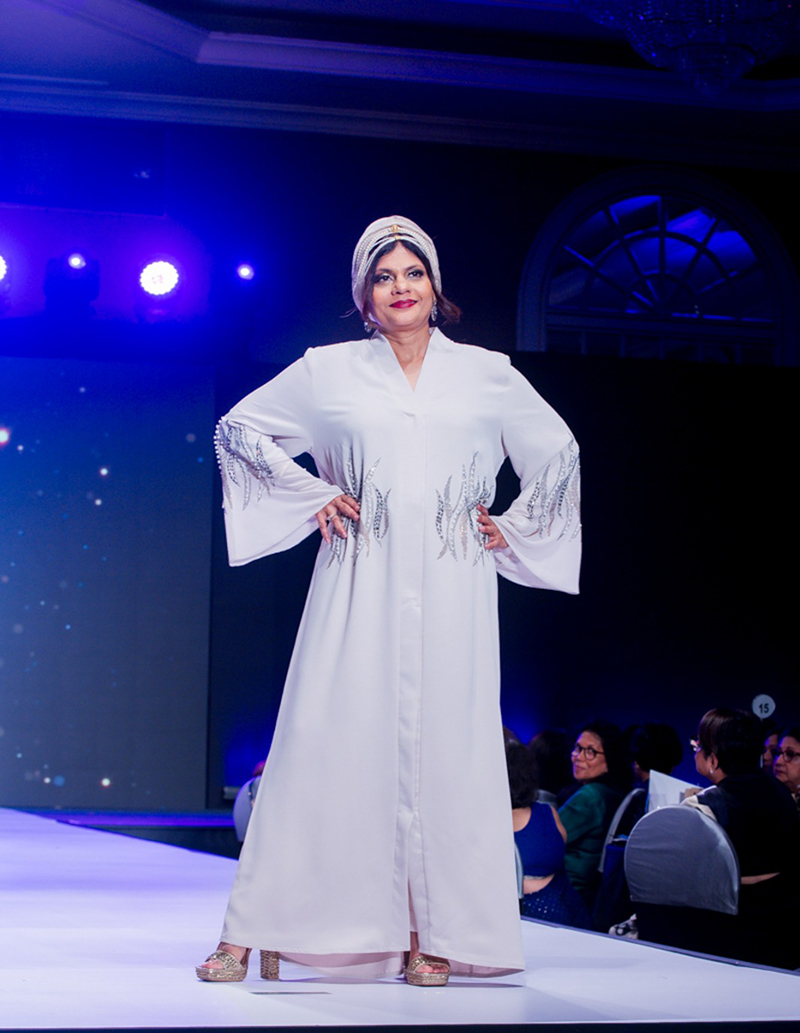Life style
Will these bills amplify women’s voices?

Women empowerment, gender and equality
Ambika Satkunanathan is a human rights advocate based in Sri Lanka. For more than twenty years she has worked with persons and communities impacted by human rights violations, and assisted them with accessing remedies. From Oct 2015 to March 2020, she was a Commissioner of the Human Rights Commission of Sri Lanka, where she led the first ever national study of prisons. Prior to that foreight years she was a Legal Advisor to the UN Office of the High Commissioner for Human Rights.
She is a board member of the UN Voluntary Trust Fund for Victims of Torture, a member of the Expert Panel of the Trial Watch Project of the Clooney Foundation and a member of the Network of Experts of the Global Initiative Against Transnational Organised Crime.
Her research, advocacy and activism have focused on counter-terrorism law and policy, drug control and rehabilitation, transitional justice, custodial violence, penal policy, militarization and gender. Her research on drug control, detention and rehabilitation in Sri Lanka, the first such study, was published in August 2021 by Harm Reduction International. She is currently working on recording the experiences of women who come into conflict with the law due to drug offences.
Her publications include contributions to the International Journal of Transitional Justice, the Oxford Handbook of Gender & Conflict, the Routledge Handbook on Human Rights in South Asia, Feminist Studies and Contemporary South Asia.
She is Chairperson of the Neelan Tiruchelvam Trust, a local grantmaking organisation in Sri Lanka and was a founder member and Vice Chairperson of Urgent Action Fund- Asia and Pacific, a feminist regional grantmaking organisation.
She was an Open Society Fellow from 2020-2022. She has a B.A. and LL.B from Monash University Australia and a LL.M from University of Nottingham, where she was a Chevening Scholar.
Could you tell us about you and some of the early influence in your life?
My experiences as a Tamil in Sri Lanka influenced the way I engaged with the world and drove me to work in human rights protection because I became aware of discrimination, violence and prejudice even as a child. As I grew older, as a woman, I experienced different forms of discrimination and prejudice that women generally face, which were worsened by my ethnic identity. This point at which both my identities intersected, and where I was exposed to the violent and ugly side of humanity is where what I believe something positive- my work, values and activism- were born.
Tell us about your most inspiring moments in your work so far?
In the kind of work I do, what I find most inspiring are the people that despite being subject to discrimination, loss, violence and pain, continue to struggle for their rights and that of others; those who continue to be humane despite the inhumane way in which the world has treated them.
What do your experience as the main challenge as someone working on human rights. And how do you deal with obstacles in your work?
The main challenge persons working on human rights protection face is the state/government viewing persons who work on human rights as enemies and threats to their power, and constantly trying to intimidate and/or discredit them and curtial and/or undermine their work.
The lack of viable, substantive and holistic remedies for persons who experience human rights violations is also a considerable challenge. Even the remedies that do exist, such as filing a fundamental rights petition in the Supreme Court or complaning to the Human Rights Commission of Sri Lanka can take months or even years, and even when a remedy is granted, it does not address all aspects of the violations experienced.
Not surprisingly, the various difficulties faced in supporting victims of human rights violations and assisting them to obtain remedies as well as challenging abusive state power can lead to feelings frustration or dejection. Personally, as a Tamil woman working on human rights I have often been labelled a terrorist, LTTE, anti-national, traitor and subject to gender-based online abuse, vilification and harassment.
One of the ways to deal with these obstacles is through collaborative work, partnerships and networks, and sharing resources. The other is long-overdue state reform, including reform of institutions such as the police. Human rights activists can advocate for such reform but it requires political will and progressive vision, which to date is sorely lacking in Sri Lanka. Another means is to step up and support those that are being attacked for the work they do or because of an aspect of their identity, such as LGBTIQ persons.
Your news on women empowerment bill, gender and equality Bill. Will these bills implement concrete actions to amplify women’s voices. There had been a national policy on women’s empowerment since 1911 your comments?
Many provisions of the Gender Equality Bill and the Women’s Empowerment Act give the appearance of sections of national action plans that have been turned into law. For instance, what is the purpose of making the appointment of focal points, which is an administrative function, a provision in a law? Furthermore, women’s groups and activists have stated they were not consulted on the gazetted version of the laws. Hence, the lawmaking process seems haphazard, was lacking in transparency and was not inclusive. The President’s remarks in parliament about the Supreme Court determination on the Gender Equality Bill where he stated that a parliamentary committee should be appointed to review the determination seems like an attempt to control judges and threatens the independence of the judiciary. Although the Suprene Court determination is problematic and not progressive, the executive undermining the independence of public institutions, particularly the judiciary, will only further erode the rule of law and democracy in Sri Lanka.
Enacting laws or establishing commissions or institutions will not magically lead to gender equality or women’s empowerment. To achieve gender equality, we need to acknowlege the patriarchal nature of Sri Lankan society and address misogyny, sexism and discrimination structurally and socially. This means we must address it in the family, school, universities, workplaces and particularly public institutions and systems.
Most importantly, do not forget that every right the government undermines, also undermines the rights of women and their safety and security. Every government attempt to undermine the rule of law, also adversely impacts women. Therefore, enacting these laws, while undermining the rule of law and public institutions and enabling violence by state entities, such as the police, is farcical and will only further undermine the rights, security and well-being of women.
Human rights remains a issue not only in Sri Lankan but all over the world. What is your assessment of the situation?
As you rightly say, human rights are under threat globally and the international legal order is being attacked and undermined. Sri Lanka is complicit in this as much as global powers, such as the US. What the detractors of the international legal order do not seem to understand or perhaps do not care about is that respecting the international legal order, international human rights standards and international processes, such as the UN processes, creates safety for all of us. Yet, the reality is that generally states do not like to be held accountable and go on the offensive when challenged, particularly in international fora as they feel being held accountable is a loss of face. States also weaponize human rights against certain countries and contexts and countries often point to other states that flout international law to justify their own violations. None of these positions are valid or viable. As I say, this is not a race to the bottom and you cannot claim the protections that international law affords only when it is expedient because then others will do the same and the result will be anarchy.
Specifically what are the main problem areas of human rights in Sri Lanka?
We have a government that does not respect the rule of law – for instance, police officers engaging in torture and the government and other state entities ignoring Supreme Court judgments and determinations is quite common. This further entrenches impunity and enables the government and state entities to abuse their power and continue to committ human rights violations. There is lack of trust in public institutions due to successive governments undermining their independence and policitising them.
Corruption is another critical issue that needs to be addressed. Repressive laws that do not adhere to international human rights standards, such as the Prevention of Terrorism Act, the Vagrants Ordinance, the Online Safety Act and provisions that criminalise same sex relations remain on the statute books.
Fifteen years after the end of the war a political solution to the ethnic conflict is elusive, and those responsible for war time violations have not been held accountable. Instead, war affected populations in the North and East, such as the families of the disappeared that demand truth and justice are surveilled, intimidated and harassed. This year families of those killed during the last stages of the war were not even allowed to hold ceremonies to remember the dead.
Socio-economic rights are also human rights- hence there are many violations that are taking place, including due to the economic crisis, such as the loss of livelihood, increasing poverty, malnutrition and reduced access to health care and education. The position of social groups that have been marginalised and discriminated against, such as persons with disabilities, LGBTIQ persons and Muslims and Malaiyaha communities remain largely unaddressed.
What are the main changes you like to see in the world particularly in relation to women and their rights?
I would like to see a world that is not patriarchal, sexist or misogynist- in which women do not have to constantly struggle to be seen, respected or heard. A world in which they are equal and have the choice to make decisions about their bodies and their lives, without being criminalised, abused, vilified, ridiculed or controlled.
ambikasat@gmail.com
Life style
India’s Republic Day

India’s Republic Day was celebrated in a spirit of unity and pride, as guests gathered to mark India’s democratic journey and its enduring commitment to freedom, diversity and progress.
India House came alive in hues of saffron, white and green as the 77th Republic Day of India was celebrated with stately elegance and heartfelt pride Set against the manicure lawns of the High Commissioner’s official residence, the annual ceremony unfolded as a graceful reminder of India’s enduring democratic spirit and its close time honoured ties with Sri Lanka.
The morning ceremony commenced with the ceremonial unfurling of the Indian Tricolour. As the anthem echoed across the grounds, dignitaries, diplomats and members of the Indian Community stood united reflective on the ideals enshrined in the constitution of India, Justice, liberty, equality and fraternity. Adding cultural depths to the occasion was patriotic and classical performances thoughtfully curated to reflect India’s rich artistic heritage.
The evening reception had invited guests, diplomats, members of Parliament and many other distinguished guests. From traditional silk saris and sherwanis to chic evening gowns and tailored suits embodying a seamless blend of culture and continue.
The reception also offered a taste of India’s culinary artistry, with meticulously curated cuisine by Taj Samudra Colombo reflecting regional flavours with a modern twist.
Among the distinguished guests were the Prime Minister, Former Presidents, Ambassadors whose presence underscored the evening diplomatic and cultural significance.
The chief guests was the Minister of Health and Mass Media Dr. Nalinda Jayatissa. The evening reach a memorable cresendo as the High Commissioner of India to Sri Lanka and Maldives delivered a speech emphasising India’s journey, its democratic value and its role on the global stage. He also spoke about the close ties between India and Sri Lanka, cultural exchanges and growing economic and strategic partnerships, reinforcing the special friendship between the two nations.
Pix by Thushara Attapathu
By Zanita Careem
Life style
Once a Heartian always a Heartian: Celebrating 130 glorious years

This year, Sacred Heart Convent Galle celebrated 130 years of excellence, and the occasion was nothing short of spectacular. Alumnae, fondly called the old girls, walked the corridors of memory, reliving the elegance, discipline and camaraderie that shaped their youth. Founded by visionary Belgian nuns over a century ago, Sacred Heart Convent began with a clear mission of nurturing not only intellect, but also character, compassion and confidence. Today it stands as a timeless symbol of holistic education, blending its rich heritage with a modern vision.
There’s a magic in returning to the place where your story began – the echo of footsteps in old halls, the chatter of friends, the quiet thrill before assembly and the sense of belonging that never fades. This year as Sacred Heart Convent Galle celebrates 130 years of excellence. I found myself walking through memories that shaped not only my education but my outlook in life.
Founded over a century age by dedicated Belgian nuns, Sacred Heart Convent began as a humble institution with a bold vision to nurture intellect, character and compassion in equal measure. Set against the picturesque backdrop of Galle, with its charm and timeless beauty, the Convent became more than a place of learning, it was a sanctuary of discipline, creativity and grace.
My earliest memories of the school are vivid. I remember the feel of my uniform on the first day, the nervous excitement, as we walked into classrooms that I will always remember Sister Adrian’s warmth, guidance and encouragement . Her presence made every lesson meaningful and every Heartian feel truly cared for.
Galle itself added a special charm to the celebrations. The gentle sea breeze, the sunlit ramparts and the serene landscape created a perfect backdrop for a day filled with memories and nostalgia.
The 130 years of celebrations were a tribute to this legacy – an ode to the school’s enduring influence and the generations it has inspired.
The familiar bell at Sacred Heart Convent rang with a deeper resonance this year, calling together generations bound by faith, discipline and shared memory. As the institution marked 130 years of distinguished service in education, the celebrations unfolded not merely as an anniversary, but as a heart felt homecoming- a return to corridors where values were shaped and lifelong friendships were born. The alumnae returned in style, sharing laughter and stories of classroom adventures, chapel recitals and play ground friendships.
The highlights of the event this year was made memorable by a much loved Back to School theme that turned time gently backwards, Old girls arrived dressed in thier school day best, laughter filling the quadrangle as familiar bells , laughter, memories marked the back to school scene .
At the heart of the foundation of the school was Sister Adrian ,the devoted Belgian nun who served as principal, she had vision, discipline and unwavering dedication that was the the cornerstone of Sacred Heart’s legacy. Generations of students carry forward her values and spirit she instilled over a century ago.
I found myself reminiscing about my own journey within its storied walls – the classrooms, the assemblies, the playground games and shared seats with friends that still bring a smile today. I remember the guidance of teachers who inspired curiosity and the gentle discipline of mentors who shaped our values.
The ‘Back to School’ feeling during the 130th celebrations was magical seeing Alumnae return, glowing with nostalgia reminded me how the spirit of Sacred Heart stay with us and remains etched in our hearts.
As the celebrations came to a close, I felt a profound gratitude for the school, for the Belgian nuns who laid its foundation For the present Principal Sister Sandya Fernando and Sister Mihiri Perera, Deputy Principal and Head of the Primary School and the teachers who carry forward this century old tradition with dedication and warmth. Their commitment to keeping the school’s spirit vibrant, bridging the gap between the history and the present. From Sister Adrian’s vision to the care of today’s dedicated sisters, Sacred Heart Convent has spent 130 shaping minds, nurturing values and inspiring generations.
For me, Sacred Heart Convent was never merely a place of learning; it was a canvas, a stage and a sanctuary, a place that taught me education is as much character as it is about knowledge.
As the school celebrated 130 glorious years, we salute Sister Adrian, and the visionary leadership of the current principal and Vice principle Thier dedication have shaped generations of Heartians, instilling values, courage and compassion For me this celebrations stirred cherished memories and a reminder that the heart of Sacred Heart beats strong, carrying its legacy forward with pride and love
By Zanita Careem
Life style
Fathuma Marleen on style, strength and grace

Threads of influence
From the buzz of a busy salon chair to the delicate precision of couture hand work, Fathuma Marleen carved a space where style,skill and sophistication intertwine.
Her signature lies in the subtle artistry of her embroidery and handwork. Every stitch, every embellishments reflect a dedication to precision and an eye for detail cultivated from her earliest days A guiding force for women she touches human lives with generosity,empathy and unwavering commitment
Fathuma Marleen’s story begins not on a runway,but behind a salon chair,scissors in hand,hair falling softly to the floor,and dreams quietly taking shape .As a young hairdresser,trained by Janet Balasuriya , she learned early the art of transformation:how confidence blooms when a woman feels seen,styled and celebrated. That intimate understanding of beauty,personal,emotional and deeply human later became the backbone of her creative journey.
But her creative spirit couldn’t be confined to hair alone In a world driven by fast fashion and fleeting trends,Fathuma Marleen’s work caught the attention of established names in the couture world. Driven by an eye for fashion, she transitioned into stitching, turn ing fabric into statements of sophistication and glamour.She went on to sew for top designers and Colombo’s fashion conscious women, contributing behind the scenes to collections that demanded excellence, consistency and technical mastery. Though her role was discreet, her impact was unmistakable among the landscape of fashion,each of her designer clothing had her signature precision. Her signature touch soon became popular among top designers ,whether it’s a flowing gown, or an Indian Shalwar or a flowing abaya, her intricate,embroidery or her sleek cut had a story . Yet at the height of her creative journey, Marleen made a personal sacrifice,she moved away from her burgeoning fashion career to join her husband in his ambassadorial role to Riyadh.
A defining chapter in Fathuma Marleen’s professional journey has been her close alliance with the Women’s Chamber of Commerce and Industry WCIS, a platform that champions entrepreneurship, creativity and leadership among women. It was Nayana Karunaratne,her close friend with whom she co-created spectacular fashion shows stood firmly by her side encouraging,guiding and gently nudging her back towards her creative calling.
Her work gained particular prominence under the guidance and encouragement of Nayana, this partnership proved transformative, and Fathuma Marleen designs stepped into the spot
Notably her creations featured at the Chamber of Commerce, fashion show led initiatives, including high profile Abaya presentation showcased at the Hilton, which left the audiences mesmerised. Her creations unveiled marked a defining movement in her journey. Modern silhouettes,rich hues and intricate embroidery,
clear lines, thoughtful detailing, appealed to modern woman who values both tradition and contemporary style. The collection resonated strongly with the audience. This show was a celebration of Marleen’s return to the spotlight The Hilton shows stood as a turning point-proof that Marleen’s design journey had depth,direction and a story still unfolding.
When her husband’s diplomatic posting took the family to Riyadh. Fathuma Marleen embraced a new chapter, one that required poise, adaptability and cultural awareness.
As an Ambassador’s wife she navigated formal responsibilities with elegance, balancing public engagements, all while maintaining her creative pursuits but limited due to new responsibilities ,yet she remained a quiet force in style and women’s empowerment,balancing diplomacy and creativity
Through it all, she remained committed to family. Her three daughters each now accomplished doctors and son Banker in the US were nurtured in an environment of discipline.
She says ‘ my family remains my cornerstone a source of pride and inspiration’. She cherishes her children and grandchildren, who continue to inspire her with thier own passions and achievements Beyond fashion, she is a dedicated social worker and champion of women,turning every endeavour into a celebration of creativity,sophistication and style. Beyond glamour, Fathuma is a woman driven by compassion. She devotes herself to running an orphanage established by her husband,carrying forward his vision and touching countless lives.
- Every stich tells a story of elegance
- Where elegance meets modesty
- Fathuma turned runways into celebrations of women and style
- Flow,flair and finesse
By Zanita Careem
-

 Business6 days ago
Business6 days agoHayleys Mobility ushering in a new era of premium sustainable mobility
-

 Business3 days ago
Business3 days agoSLIM-Kantar People’s Awards 2026 to recognise Sri Lanka’s most trusted brands and personalities
-

 Business6 days ago
Business6 days agoAdvice Lab unveils new 13,000+ sqft office, marking major expansion in financial services BPO to Australia
-

 Business6 days ago
Business6 days agoArpico NextGen Mattress gains recognition for innovation
-

 Business5 days ago
Business5 days agoAltair issues over 100+ title deeds post ownership change
-

 Editorial6 days ago
Editorial6 days agoGovt. provoking TUs
-

 Business5 days ago
Business5 days agoSri Lanka opens first country pavilion at London exhibition
-

 Business4 days ago
Business4 days agoAll set for Global Synergy Awards 2026 at Waters Edge
























